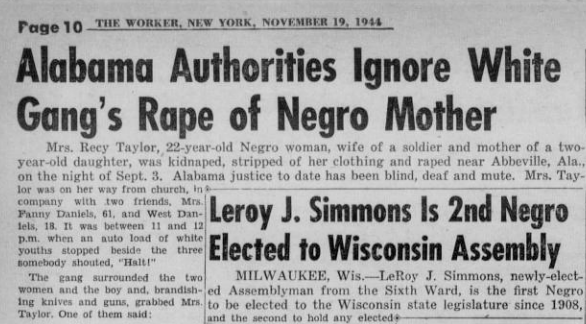
The Rape of Recy Taylor is a documentary film which premiered in 2017. The topic is the criminal justice system in the United States with special focus on a crime which took place on 3 September 1944: a young black woman (Recy Taylor) was abducted and raped by six or seven young white men, who were identified but never punished for what they did.
Here are the basic facts about the case:
In September 1944, Recy Taylor was 24; she was married and the mother of a young child. She was walking home from church. The young men, who abducted and raped her, were teenagers, aged 14-18.
The crime took place near the town of Abbeville in the county of Henry, Alabama, a southern state.
The perpetrators were quickly identified and interviewed by the police. The case was brought before a grand jury, but the all-white members of the grand jury refused to recommend an indictment. Therefore the suspects were never tried in a court of law. They were never even arrested.
NAACP heard about the case and sent an investigator to meet with Recy Taylor in Abbeville. Her name? Rosa Parks. Today she is known as the woman who started the bus boycott in Montgomery, Alabama, in 1955.
NAACP used the case to conduct a national campaign about equality before the law. In 1944 and 1945, Recy Taylor’s case received a good deal of publicity in the American media. But before long it was forgotten. Today it is sometimes described as a precursor of the Civil Rights Movement which developed in the 1950s and the 1960s.
In 2011, the Alabama Legislature issued an official apology on behalf of the state “for its failure to prosecute her attackers.” Fortunately, Recy Taylor lived long enough to receive this message. She died in 2017.
Here is some basic information about this film:
** Writer, producer, and director: Nancy Buirski
** Inspired by the book At the Dark end of the Street: Black Women and Resistance by Danielle L. McGuire (hardcover 2010, paperback 2011)
** Available on DVD and via Amazon Prime Video
** Run time: 90 minutes
Several people are interviewed in the film. I will not mention all names, because the complete list is too long. Here are some of the names:
** Robert Corbitt = Recy Taylor’s brother
** Alma Daniels = Recy Taylor’s sister
** Larry Smith = a resident of Abbeville, a local historian
** Danielle McGuire = a scholar and an author
** Crystal Feimster = a scholar and author of the book Southern Horrors: Women and the Politics of Lynching (2009)
Nancy Buirski is an American filmmaker. She is the director of Loving (2011); she is the producer of Althea (2014) and The Loving Story (2016).
When Nancy Buirski was working on this film, Recy Taylor was still alive, but she was too old to be interviewed on camera. She appears briefly towards the end of the film. She did an interview that was recorded (audio only) some years ago. An excerpt of this interview is used in the film.
What do reviewers say about this film? Here are the results of three review aggregators:
** 57 per cent = IMDb
** 73 per cent = Meta
** 94 per cent = Rotten Tomatoes
As you can see, the reviews are mixed: some are positive, while others are negative. All reviewers declare that the case of Recy Taylor is important, but some reviewers do not like the film Nancy Buirski has made about the case.
What is wrong?
Richard Brody, one of the critical reviewers, offers six reasons why the film is flawed:
# 1. The film comes far too late. It should have been made 30 or 40 years ago, when Rosa Parks and Recy Taylor were still alive and able to talk about their experiences with the case.
# 2. Interviews are accompanied by music playing in the background, as if the statements are unable to stand alone. This is not a good idea.
# 3. A historical clip of Martin Luther King Jr. giving a speech is accompanied by music playing in the background, as if his speech is unable to stand alone. This is not a good idea.
# 4. Many of the images which are used in the film are general, not specific; i.e. they have no direct connection with the case. We see some trees; we see a street; we see the lights of a car moving in the dark. This is not a good idea.
# 5. Nancy Buirski herself does not appear in the film. We never see her talking to the people that she interviews.
# 6. There is no information about how the film was made:
** Was it easy or difficult or perhaps even dangerous to make this film about a very sensitive topic?
** How did local people in Abbeville respond when an outsider came to their town in order to make a film about a crime that was committed in their community long ago?
[Reference: Richard Brody, “The Rape of Recy Taylor: An Essential, Flawed Documentary at the New York Film Festival,” The New Yorker, 3 October 2017; available online.]
The Guardian published two reviews of this film: one offers 4 of 5 stars, while the other offers 3 of 5 stars. The Roger Ebert website offers 2 of 4 stars, i.e. a rating of only 50 per cent.
If you ask me, the critical voices have a strong case when they say the case of Recy Taylor is essential, but Nancy Buirski’s film about the case is not as good as it should be.
There are positive and negative elements in this film. Unfortunately, the latter are stronger than the former.
While I hesitate to offer a low rating to a film about such an important case, I think there is no way to avoid it.
This film is not great; it is not even good; it is just average; therefore it cannot get more than three stars.
*****

Nancy Buirski (born 1945)
*****

A newspaper clipping from 19 November 1944
*****
A newspaper clipping from 28 October 1944
*****

No comments:
Post a Comment